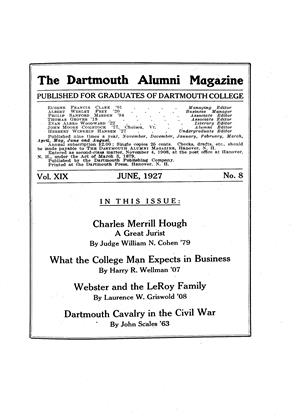Readings in Recent American Constitutionl History, 1876-1926. Allen Johnson, Professor of History in Yale University, and William A. Robinson, Professor of Political Science in Dartmouth College, Editors. Charles Scribner's Sons, New York. 1927. Pp. XV, 511. Reviewed by JAMES P. RICHARDSON
This is a sequel to an earlier volume by Professor Johnson, "Readings in American Constitutional History, 1776-1876." which has long been a standard. In it Professor Robinson has ably collaborated with his former teacher to produce a book which undoubtedly "will prove useful to the lawyer, the holder of public office, and all persons interested in problems of Ameri- can government and citizenship," to quote the hope expressed in the preface, as well as to the college classes for whose use it is primarily intended.
It contains 136 selections, grouped into fortytwo chapters; and to each chapter is prefaced a concise introductory and explanatory note by the editors.
Perhaps some people imagine that the work involved in a book of this sort is of an inferior order, and less exacting in its nature than that entailed in writing a book of one's own; but the writer would be ready to defend the other side. The problems of selection, arrangement, verification, and proper comment call for a high degree of scholarly ability, and painstaking labor. This volume is proof positive that both the necessary labor and the ability have entered into its preparation, which will not surprise anyone who knows either Professor Johnson or Professor Robinson.
Nearly one-half of the selections are from court decisions, as is natural. In such a mass of material as exists, the problem became a rigid "selective process," and in such a case there will always be room for slight divergencies of judgment. For example, the omission of such a case as Walls vs. Midland Carbon Company, 254 U. S. 300, which shows how far the courts are prepared to go in upholding the police power of the states as against private "rights" when natural resources are involved, seems regrettable; but of course the line had to be drawn somewhere. Space will permit specific mention of only one typical chapter, which, however, gives an idea of the quality and timeliness of the work. It is that on "Federal Subsidies to the States" with five readings of a most illuminating character. It is unfortunate that the book went to press just before the decision in Myers vs. U. S., which seems to have pretty thoroughly settled the long-standing controversy as to the Presidential right to remove office-holders without Senatorial consent.
Unstinted praise is to be given to the chapter introductions, which are largely the work of Professor Robinson. They are admirable, both in form and substance.
 View Full Issue
View Full Issue
More From This Issue
-
 Article
ArticleTHE UNDERGRADUATE CHAIR
June 1927 -
 Article
ArticleWHAT THE COLLEGE MAN EXPECTS IN BUSINESS
June 1927 By Harry R. Wellman '07 -
 Article
ArticleATHLETIC COUNCIL REPLIES TO PRESIDENT HOPKINS
June 1927 -
 Article
ArticleSECRETARIES ASSOCIATION MEETS IN HANOVER
June 1927 -
 Article
ArticleDARTMOUTH CAVALRY IN THE CIVIL WAR
June 1927 By John Scales '63 -
 Article
ArticleCAN CHINA SURVIVE
June 1927
Article
-
 Article
ArticleTHE ALUMNI AND THE ALUMNI FUND
June 1916 -
 Article
ArticleFRESHMEN TURN IN AVERAGE INTELLIGENCE TEST GRADES
December 1921 -
 Article
ArticleTucker Foundation
APRIL 1994 -
 Article
ArticleCarving Out Spaces
September 1979 By Beth Baron '80 -
 Article
ArticlePOSTGRAD PLANS
DECEMBER 1962 By C.E.W. -
 Article
ArticleChasing the Best Burger
September | October 2013 By Lauren Vespoli ’13

